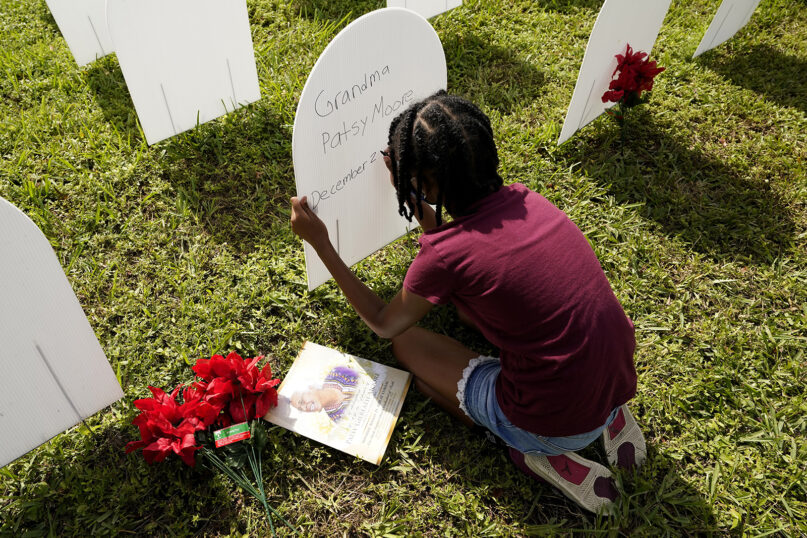(RNS) — How do you heal the brokenness of your life after a loved one dies, after a hurricane strikes, after gunshots shatter your life, after the devastation of a global pandemic? In religious societies such as the United States, one common bulwark has been to hold fast to a belief in a loving God.
But what about those among us for whom this is just not an option; we just don’t or can’t believe in a benevolent deity who will make things right?
An overwhelming majority of the survivors of Hurricane Katrina found solace in religious faith and reported their belief in God was all the stronger following the disaster. In “A Letter to a Christian Nation,” secularist Sam Harris derides this and claimed this affirmation is akin to spitting upon the graves of their deceased loved ones.
I believe it is Sam Harris who is being simplistic here, not the survivors. People who attribute the death of their loved ones to God are trying to find a reason for their loved one’s death, attributing it to an inscrutable but just deity is their way of doing this. If they find solace in this, what harm does this do, and who am I to gainsay it? I do not share this belief, but I respect it.
The reasons people like me are skeptical are as diverse as the snowflakes on a lazy winter morning, but when faced with tragedies, skepticism boils down to what may seem a cold hard truth: God won’t help us.
God won’t help us, but faith can. Not faith in any higher power, but faith in ourselves, in the collective power of humanity to effect change for the better.
In many languages the general concepts of faith or belief are used to designate a particular belief in God. If you are faithful or a believer, in colloquial language this means you believe in God. In some English dictionaries, the No. 2 definition of faith is faith in the almighty.
In my case, at least, this actually makes sense; my beliefs and the beliefs of God’s faithful share critical features. Just like God’s faithful, I, too, believe in something larger than myself, and my beliefs are big and bold. I believe in the power of 8 billion human beings to bring about a better life for every person. That is why I presume to forgive colloquial language for the conflation of my secular beliefs and belief in God.
When one of my best friends was run over by a truck 13 years ago, I was flung into one of my worst depressions ever. He was like me in so many ways: bumbling, socially inept but kindhearted, smart. I loved him. His death was senseless. The last wisps of a belief in a caring God left me, and as a coping mechanism I wrote poems about betrayal and a search for meaning.
Those poems were a beginning for me, though. They catalyzed a process of writing prayers and liturgy drawing from a deep well of faith, faith in human beings to overcome tragedy and catalyze new and wonderful things. Ever since those dark days more than a decade ago, I have been very deliberate about this. I allow myself grief and mourning, for these are healthy human emotions, but then I try to fashion these memories of good people into a blessing for myself and others.
There are so many tragedies we have confronted in this year of pandemic, so much death, so much upheaval of rhythm and routine. I have been unlucky enough to officiate at two funerals. Or perhaps I should say, I have been lucky to officiate at only two funerals. We must mourn for so much, but mourning need not mean fatalistic paralysis. We need not say, “things are bad now, so they will stay bad, and there is nothing we can do to change it.”
There is a temptation among secularists to attribute this type of fatalism predominantly to those among us who believe in God or who are conservative. Let us forego this temptation. It is lazy and simplistic; such paralysis may grip any person or community.
There is broad agreement about the many ills that plague us in the United States. Too many people die in this country from gun violence. Our infrastructure, our roads and bridges, are crumbling. We face a humanitarian crisis at the borders of our country, so many people are trying to cross, and we don’t have the structures in place to contend with it. The partisan divide is so deep and wide, so bitter.
I am not offering a particular solution to any of these problems, just the abiding faith we can solve them, faith in my power and the power of the human collective to solve anything we set our minds to. Call me a deluded optimist, but I believe in this. I believe in us.
(Dr. Tzemah Yoreh is one of the intellectual leaders of Jewish humanism and the head of the City Congregation in New York City and the author of several books, including his newest, “Why Abraham Murdered Isaac: The First Stories of the Bible Revealed.” The views expressed in this commentary do not necessarily reflect those of Religion News Service.)





